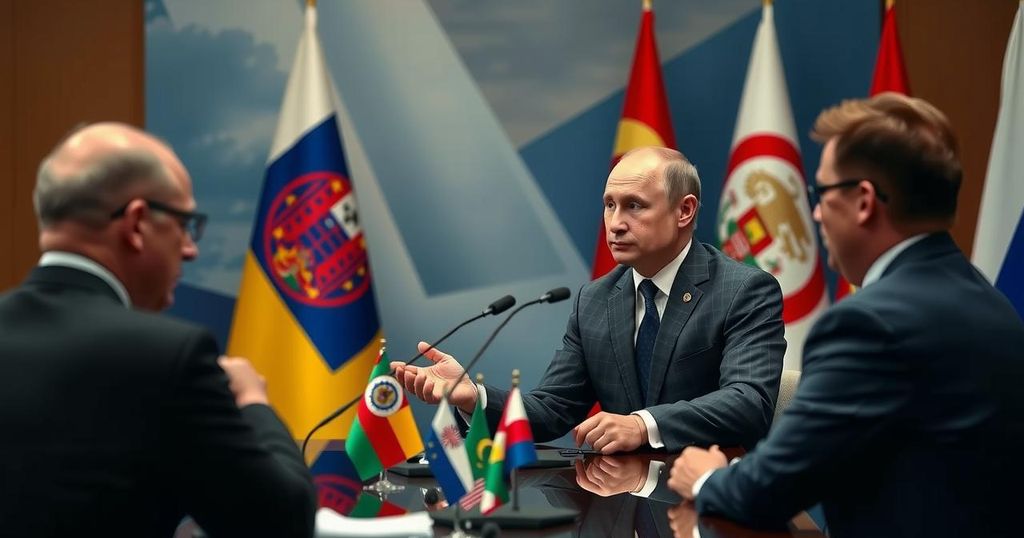Putin Hosts Brics Summit to Demonstrate Russia’s Resilience Against Western Pressure

President Putin is hosting the Brics summit in Kazan to assert that Western sanctions have failed to isolate Russia, gathering over 20 heads of state including leaders from China and India. While aiming to find alternatives to the US dollar for trade, the summit faces challenges due to internal divisions among Brics members, highlighting the complexities of global geopolitics.
Imagine yourself in the position of President Vladimir Putin, faced with severe international scrutiny and sanctions following the invasion of Ukraine. With an arrest warrant issued against you by the International Criminal Court and the Western world labeling you a pariah, what actions could you undertake to convey that such pressures are ineffective? In an effort to showcase resilience, President Putin is hosting the Brics summit in the city of Kazan this week, where he will welcome over 20 heads of state, including notable leaders such as Xi Jinping from China, Indian Prime Minister Narendra Modi, and Iranian President Masoud Pezeshkian. The Kremlin heralds this event as one of the most significant foreign policy gatherings in Russia’s history. As highlighted by Chris Weafer, founding partner of Macro-Advisory, “The clear message is that attempts to isolate Russia have failed.” He articulates that this gathering enables Russia to demonstrate its capacity to endure sanctions, despite underlying economic vulnerabilities. The Kremlin’s narrative pivots on the notion that Russia maintains a robust network of allies. The Brics acronym represents a coalition of Brazil, Russia, India, China, and South Africa, created as a counterbalance to the Western-centric global order. The bloc has expanded to include Egypt, Ethiopia, Iran, and the United Arab Emirates, with Saudi Arabia also invited to join. Collectively, the Brics nations account for 45% of the world’s population, and their combined economies are valued at over $28.5 trillion, constituting approximately 28% of the global economy. Russian officials express that around 30 additional countries are eager to join Brics or deepen their affiliations with it, conversations likely to dominate the summit as Russia positions itself as representative of the so-called “global majority.” However, the effectiveness of this summit goes beyond mere optics for Mr. Putin. In light of the sanctions, he aims to rally Brics members towards establishing an alternative to the US dollar for international transactions. Weafer notes, “A lot of the problems Russia’s economy is facing are linked to cross-border trade and payments. And a lot of that is linked to the US dollar.” Russia aspires to dismantle the dollar’s primacy in trade settlements and advocate for a new trade mechanism independent of the dollar, euro, or the G7 currencies to mitigate the impact of sanctions. Nevertheless, disparities among Brics members may hinder the bloc’s potential efficacy. Jim O’Neill, former Chief Economist at Goldman Sachs, points out that “likeminded” does not accurately describe Brics, citing the continuous disagreements between Indian and Chinese interests. He notes that while both nations strive for non-confrontation, their inability to collaborate economically poses a significant challenge. Moreover, tensions are also present among newer members like Egypt and Ethiopia, as well as between Iran and Saudi Arabia, who have a history of rivalry. O’Neill argues that expecting these nations to reach substantial consensus is overly optimistic. While Russia seeks to rally support based on anti-Western sentiments and the narrative of a new world order, countries such as India maintain a strategic interest in fostering strong ties with Western powers. At the summit in Kazan, Mr. Putin must navigate these divides while projecting a united front to both the Russian populace and the global community, illustrating that Russia stands resilient and engaged on the world stage.
The Brics nations, comprising Brazil, Russia, India, China, and South Africa, emerged as a collaborative bloc to challenge the dominance of the G7, which represents the major advanced economies. Amid escalating tensions due to Russia’s actions in Ukraine, particularly the subsequent sanctions imposed by the West, President Vladimir Putin is hosting a summit to reaffirm Russia’s alliances and depict a narrative of resilience. This summit serves as a platform for Putin to garner support from emerging economies against Western sanctions and to explore alternative mechanisms for global trade that do not rely on the US dollar. The conference aims to consolidate political and economic ties among the member countries, while also addressing noticeable divisions within the bloc.
In conclusion, the Brics summit hosted by President Vladimir Putin aims to dispel the notion of Russia’s isolation precipitated by Western sanctions, showcasing an alliance of emerging economies. While the summit serves to strengthen economic ties and discuss alternatives to the US dollar, the inherent differences among member nations may complicate collective action towards achieving substantial agreements. As the world watches, Putin’s challenge lies in masking these divisions while portraying an image of unity and resilience within the Brics coalition.
Original Source: www.bbc.com








